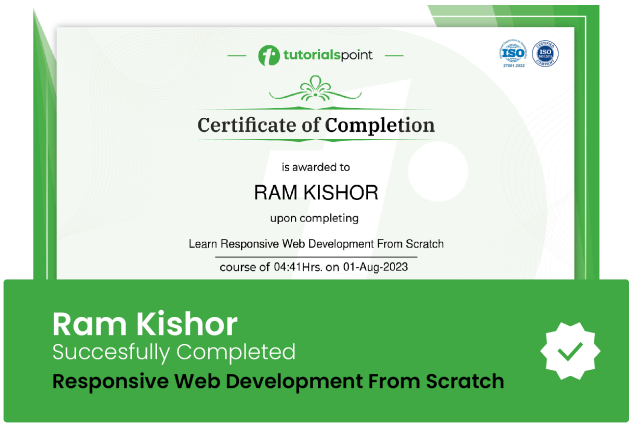Hardware Programming in Micro Python
Learn Micro Python easily and unleash the power of Micro Python coding using Real life examples and Practice activities

Lectures -60
Resources -21
Duration -4.5 hours

30-days Money-Back Guarantee
Get your team access to 10000+ top Tutorials Point courses anytime, anywhere.
Course Description
>>>Learn Micro Python easily and unleash the power of Micro Python coding using Real-life examples and Practice activities. <<<
Welcome to this course.
Micro Python is one of the most popular and fastest-growing programming languages in the world. It's used for all sorts of tasks including web programming and data analysis; and it's emerged as the language to learn for machine learning. That popularity means that Micro Python developers are in demand and Micro Python programming jobs can be lucrative.
Why you should take this course?
- Learn programming in Micro Python
- Unleash the power of Micro Python coding
- A step by step guide to developing hardware projects with Micro Python
- Real life examples and Practice activities for a more fun learning experience
- Flexible, open source, and cross-platform programming language
- Perfect for quickly prototyping any idea on a microcontroller
- Easy to learn and understand
These are all great reasons to learn how to program in Micro Python. This course will provide an introduction to use Micro Python to build an app that can be a starting point for becoming a Micro Python programmer.
Are you interested in the Internet of Things, home automation, and connected devices? Have you ever wondered what it would be like to build a Microcontroller Based Project or even your own robot? If so, then you are in luck. Micro Python can help you do all of these things and even more.
Now, as you know, automation and the Internet of Things are among the most trending topics nowadays, and knowing about Python, Home automation, and the Internet of Things is a must for any embedded system engineer.
In this course, we will talk about the history of micro python and the differences between Micro Python and other programming languages, the hardware you must use to build devices using Micro Python, and the process to step up code and deploy your own Micro Python project.
Why You Should Learn Micro Python?
- Easy to learn.
- Supports quick development.
- Cross-platform.
- Open Source.
- Extensible.
- Embeddable.
- Large standard library and active community.
- Useful for a wide variety of applications.
- Wide Microcontroller Support.
You’ll learn how to:
- Explore the choices available to run Micro Python
- Use Micro Python to execute codes
- The history Micro Python
- Why using Micro Python, why not using any other language?
- Differentiate between Micro Python and other programming languages.
- Micro Python hardware and different hardware that you can use and they interact easily with micro python coding.
- Micro Python workflow in detail.
- How to set up micro python on your board. Whatever the Microcontroller board that you have chosen or whatever the board that you have at hand.
- Creating and deploying your code and testing it out.
At the end of this course, you can create Innovative Projects using Micro Python. The only thing that you need to do is THINKING, WIRING & CODING. You'll have no idea about Python home automation and the Internet Of Things will be changed.
Who this course is for:
- Anyone interested in Programming Hardware in Micro Python
- Anyone interested in Micro Python hardware and different hardware that you can use and they interact easily with micro python coding.
- Anyone interested in How to set up micro python on your board. Whatever the Microcontroller board that you have chosen or whatever the board that you have at hand.
- Anyone interested in Creating and deploying your code and testing it out using Micro Python
- Python Geeks
- Anyone interested in one of the most requested Programming languages in the World right now
- Engineering Students - Electronics, Electrical & Computer Science
- High School Science Students
- Electronic Geeks, Hobbies & Art Students
- Embedded Systems Geeks
- Microcontroller Geeks
Goals
What will you learn in this course:
- Explore the Boards available that supports Micro Python
- Use different ways to execute Micro Python codes
- Write Micro Python code that takes input and produces output
- The history Micro Python
- Why using Micro Python, why not using any other language?
- Differentiate between Micro Python and other programming languages.
- Micro Python hardware and different hardware that you can use and they interact easily with micro python coding.
- Micro Python workflow in detail.
- How to set up micro python on your board. Whatever the Microcontroller board that you have chosen or whatever the board that you have at hand
Creating and deploying your code and testing it out.
Prerequisites
What are the prerequisites for this course?
Basic Knowledge of Digital Electronics

Curriculum
Check out the detailed breakdown of what’s inside the course
Introduction & Getting Started
4 Lectures
-
Introduction 02:30 02:30
-
Who We Are? 05:18 05:18
-
Important Note
-
History of MicroPython 04:49 04:49
MicroPython Walkthrough
3 Lectures

What is A Microcontroller?
1 Lectures

Why MicroPython?
2 Lectures

MicroPython Hardware
1 Lectures

MicroPython Workflow
2 Lectures

Create and Deploy Code using IDE
2 Lectures

ESP32 Board with MicroPython
5 Lectures

Practical: Blink Led Practical Example
2 Lectures

Practical: Led Fading Example
2 Lectures

Practical: Fading an LED In and Out
2 Lectures

General board control
1 Lectures

Timers and Delay
1 Lectures

Pins and GPIO
1 Lectures

PWM (pulse width modulation)
1 Lectures

ADC (analog to digital conversion)
1 Lectures

SPI bus
1 Lectures

I2C bus
1 Lectures

Real time clock (RTC)
1 Lectures

Deep-sleep mode
1 Lectures

RMT
1 Lectures

OneWire driver
1 Lectures

NeoPixel driver
1 Lectures

Capacitive touch
1 Lectures

DHT driver
1 Lectures

Troubleshooting Tips
3 Lectures

The End
1 Lectures

Extra
2 Lectures

Python Coding for Beginners
14 Lectures

Instructor Details

Ashraf Said
eCourse Certificate
Use your certificate to make a career change or to advance in your current career.

Our students work
with the Best


































Related Video Courses
View MoreAnnual Membership
Become a valued member of Tutorials Point and enjoy unlimited access to our vast library of top-rated Video Courses
Subscribe now
Online Certifications
Master prominent technologies at full length and become a valued certified professional.
Explore Now


 Updated on Apr, 2024
Updated on Apr, 2024
 Language - English
Language - English